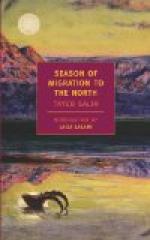[Illustration: Towing the Wrecked Barge Ashore]
This accident causes everyone to look grave. The Edmonton value of the cargo is over two thousand dollars, but it is a loss that cannot be measured in dollars and cents. These wrecked goods, gaily sailing down the Athabasca, cannot be duplicated at some convenient grocery around the corner.
We have learned that any untoward happening means a half day’s delay. Philip Atkinson calls me to one side to suggest that it would be a “clear waste” to leave behind the eggs of “that duck’s nest I showed you the day we came.” Atkinson is a half-breed with a Hercules-build who looks forty-five and owns up to sixty. He and I chatted over the mallard eggs and my collection of wild flowers, he respecting the preservative art and I in full awe of that art gastronomic of his which gulps the Mallards-in-embryo, sans fourchette, sans salt, sans ceremony.
They are an interesting study, these half-breeds; it means much to each on which side of the English Channel his father had birth. When a Frenchman marries an Indian woman he reverts to her scale of civilization; when a Scot takes a native to wife he draws her up to his. Our crew live at Lac la Biche and were engaged last winter for their season’s work at from twenty to forty dollars a month, with board and moccasins. They walked a hundred miles to Athabasca Landing to connect with their summer’s job, and the absolute certainty of regular meals just now appeals. They get three meals a day going with the current, and four while tracking back, with meals thrown in when anything unusual happens or a moose is killed. One cannot help wondering how that elastic term “the law of heredity” works out with these people, cut off from the lives their fathers led and from the free woods-life of the pre-civilization Indian.
Philip, duck-stuffed but untroubled by “that full feeling after eating,” lights his pipe and looks back through the years. “My father belonged to The Company, my mother was an Ojibway from the Lake of the Woods country. My father went back to the Old Country when I was seven, leaving me to an uncle to be educated, and I don’t know ‘B’ from a bull’s foot. He put me to work on the woodpile from morning till night. When my father came back after twelve years and found me ignorant, he cried like a baby. I have no education, but,” with a contemplative puff, “I have friends wherever I go.” Philip is good to look at and he is a linguist, speaking Cree, French, and excellent English with a delightful Scotch accent. He is an ardent admirer of the H.B. Company. “They always kept their word with a man, and when they had done with him, returned him without cost to his old home.” Philip and his two sons were the first to shoot the Grand Rapids, and he tells us that this stretch of the Athabasca River has been used only twenty years. Before that time people from the North reached Winnipeg by the Clearwater. Philip is a Loyalist. During the half-breed rebellion of 1885 he carried dispatches to Middleton and Otter, going seventy-five miles one day on foot. He had his horse, “a draught-horse as black as a crow,” taken from him twice, got through the lines and stole another, and tells proudly how for his deed of valor he was presented with an Assomption belt.




